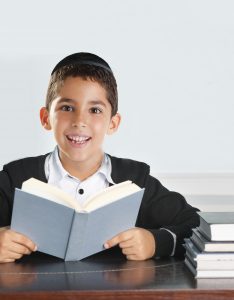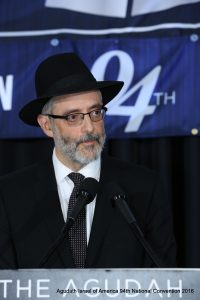The State of Our Schools
An Interview with Rabbi Chaim Dovid Zweibel
Shea Rubenstein
As writers for a monthly publication, we at the Jewish Echo often focus on articles that remain current and of interest rather than on up-to-the-minute headlines. The battle for our yeshivos’ survival, however, raises questions and concerns that remain with us as the new guidelines are amended, argued, and G-d willing, resolved.
Agudath Israel of America has been leading the effort to maintain the educational norms upheld in our yeshivos for decades, norms which have allowed us to educate our children within a Torah-true framework. Rabbi Chaim Dovid Zweibel, executive vice president, sat down with me to discuss the background of the new guidelines, the issues involved, and the case for keeping our schools alive.
Shea Rubenstein: What brought the issue of yeshivah curriculum to light now? Why has the SED (New York State Education Department) decided to rewrite the rules?

Rabbi Zweibel: The (basic yeshivah) education itself has been pretty much the same for the past 50 years, and our community has been generally satisfied with their performance. Parents have the right to send their children to the schools of their choice, and their active choice to send to a yeshivah is an indication that they are content with the secular studies offered at that particular institution. YAFFED (Young Advocates for Fair Education) is an advocacy group that was formed by some former yeshivah students who felt that they lacked education. To “help” other yeshivah students, they decided to take this conversation to the state instead of to the yeshivah itself. I feel that this is a conversation that should happen but not with the state. The state does not understand our children or our way of life, and it can become very dangerous if the government gets involved in our children’s education.
SR: Is the state not required to make sure that our children have a robust education?
RZ: The state must make sure that schools provide a “substantially equivalent instruction” to public schools’ in basic studies, and they must make sure that our children are equipped to enter the real world. Our Torah tradition also asks of parents to provide our children with a trade, so they are not dependent on others. Now the question is what must be taught without weakening our emphasis on the subjects that are inherent to our faith. Do our children have to learn trigonometry? Will that make them better at business? Do we have to teach all the subjects taught in public school including evolution? Once the state gets involved in these details it can become very dangerous. If they feel the need to get involved more deeply, it should be with a “light touch” not a hard hand or checklist. I would like to reemphasize that the state is not evil but rather using a fact sheet and checklist. That approach can never work across the board for so many diverse schools.
SR: The JCC of Marine Park has been involved over the past few years to help yeshivah graduates strengthen their communicative and business skills with conferences and vocational and computer programs. I know that the Agudah has also been on the cutting edge offering many different services and educational programs. Do you feel that there really is a lack of secular education in our schools? What do you feel is the correct approach?
RZ: I think each school should be able to determine what needs to be taught within the guidelines of its mesorah. The point of a yeshivah is to provide yiddishkeit, mesorah, and Torah, as well as secular studies – not the other way around. If secular education was the focus then we would be sending our children to secular schools. We do have an organization formed for this purpose called PEARLS, which works on bringing yeshivos together and creating a better program for the yeshivah system.
SR: I understand that you have a friendly relationship with Commissioner Elia. What has changed, if anything? Has she been receptive to your requests?
RZ: I consider her to be a fine person, and we do have a good relationship with her. That’s why I was very confused about why this had all taken place so quickly without our consultation. All our elected officials, including those in the assembly and state, have to be educated on our yeshivah priorities and on the subjects that we do teach, because at the end of the day, we do produce great students.
SR: The people trying to push this agenda are showing statistics of high dependency on public assistance among yeshivah graduates and attribute these numbers in part to lack of proper education.
RZ: I’m not sure that graduates of public school show difference statistics, especially when you compare family size (many frum and Chassidish families have eight or more members). I think the fact that they are large families allows them to have benefits even though they are earning a living. I think that in many ways, the success of our students boils down to priorities. Success is not measured by dollars. It’s measured by the students we produce and their priorities. They can make an educated decision for themselves.

As far as academic success, we recently filed an amicus curiae (friend of the court) brief on behalf of a prestigious attorney supporting the Felder amendment, which allows chareidi schools to determine if they meet state curriculum requirements. The brief states that the income levels and levels of education of our students are on par with those of public school graduates.
SR: Has the needle moved on the recommendations due to the outpour of support for the private school system from yeshivah and Catholic school parents?
RZ: The original recommendation had proposed 35 hours a week of secular studies. On December 19, it was reduced to seventeen and a half hours a week, but if you take into account that we don’t teach those subjects on Sunday and Friday, that comes out to over four hours per day of secular studies. When having such a rigorous education, the additional time plus Jewish studies can be taxing.
SR: Have you received support from any other governmental bodies?
RZ: Yes. 29 members of the New York City Council sent a letter to the state expressing their concerns, and the overwhelming majority of these members are not Jewish.
SR: How does Church and State factor into the state’s involvement in our schools?
RZ: The state does have the responsibility to make sure that every child receives an education, just as they have to make sure that every child has a home and is not abandoned. The state does not financially subsidize our schools because they do not promote private or religious studies. That’s a choice that parents make knowing they can receive a free education through public school.
SR: Any final thoughts?
RZ: It’s important to remember that Yiddishkeit in America was built only because the Jewish community made yeshivah education and their mesorah their utmost priority, instead of sending their children to public school and providing a Jewish afterschool program. Parents spend more money on Jewish education than on any other line item in their budget because this is so important to them. A boy learning Gemarah, Chumash, and ethics is receiving a very rigorous education. It’s not that our schools don’t educate our children; the only question is exactly how much secular education is needed to enhance that to produce a self-sufficient adult. That answer will vary based on mesorah.
Sidebar: The Numbers Speak for Themselves
Excerpt from an article in the Jewish Press, written by Sandy Eller
Relevant to the discussion are Regents examination scores recently obtained by The Jewish Press under a Freedom of Information Law request.
These scores reveal that New York yeshivah students are outperforming their public school peers in the four core subjects of English, math, science, and history – by far.
They show, for example, yeshivos earning 19 of the top 20 average private school scores in New York’s English Language Arts exam.
Brooklyn’s Beth Jacob High School for Girls’s 91.1 average was the highest in the state, with Bobov’s Congregation Machna Shalva, Shaare Torah, and Bais Yaakov Academy coming in with 89.6, 87.3 and 87.2, respectively – well ahead of the local public school average of 58.4.
In Queens, Shevach High School and Torah Academy for Girls students averaged 88.4 and 87.4, respectively, ahead of public school average of 60.9.
Students outside New York City fared similarly, with Nassau’s Midreshet Shalhevet Girls, Stella K. Abraham High School for Girls and Torah High School Long Beach averaging 90.2, 86.9, and 86.9, respectively, with public schools averaging just 61.8.
In Rockland County, Bais Yaakov of Ramapo’s 88.1 average surpassed the public school’s 63.4.
Rounding out the top 20 with average scores of 85.4 or better were Shulamith School for Girls of Brooklyn, Congregation Machne Chaim, Torah Vodaath High School, Mesivta Tiferes Yisroel, Bais Yaakov High School of Spring Valley, Bais Menachem, Rambam Mesivta – Maimonides High School, Bais Brocho of Karlin Stolin, and Yeshiva Ohr Shraga D’Veretzky.
In the Algebra 2/Trigonometry exam, yeshivos earned nine of the top 10 private school scores in the state. In Brooklyn and Queens, Machon Bais Yaakov Hilda Birn High School, Beth Jacob School High School for Girls, Bet Yaakov Ateret Torah High School, Beth Jacob, Yeshiva Shaar Hatorah High School, and Torah Academy for Girls all had average scores that beat public school results by over 20 percentage points.
In Rockland County, Beth Rochel High School and Bais Yaakov of Spring Valley bested their peers’ average scores by over 15 percentage points, while in Nassau, Hebrew Academy of Five Towns and Rockaway students scored just over 12 percentage points higher than their public school counterparts.
Seven out of the top 10 private school scores reported in the Global History Regents exam were also earned by yeshivas. While Brooklyn schools averaged a score of 64.7, Bobov’s Congregation Machna Shalva and Bais Yaakov High School tied for the second highest average with a score of 92.7, two tenths of a point ahead of the Bais Esther School.
Shaar Hatorah students bested their Queens public school counterparts by 21.7 percentage points, while Yeshiva Ohavei Torah of Riverdale’s average was 26.1 percentage points higher than that of Bronx public school students.
Not surprisingly, similar results were seen in the Physics Regents, where the highest average score in the state – 90.1 – was earned by Shevach High School in Queens, closely followed by Yeshiva of Far Rockaway and Torah Academy for Girls High School, while local public school students averaged just 71.8.
Students at Mesivta Ateres Yaakov and the Davis Renov Stahler Yeshiva High School in Nassau County averaged 83.2 and 82.1, ahead of the public school average of 77.5.
And in Brooklyn, Mesivta Tiferes Yisroel’s average of 88.1 was well ahead of the public school average of 73.2.
You must be logged in to post a comment.